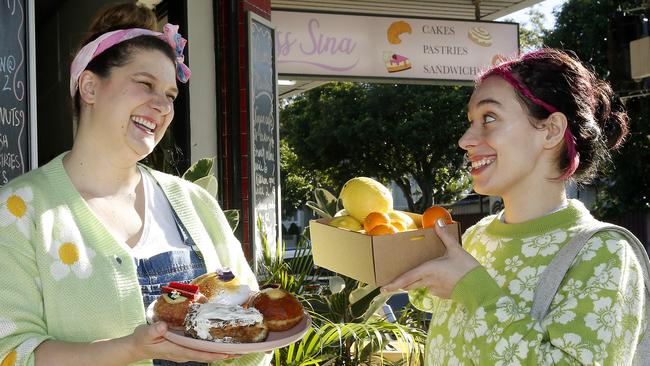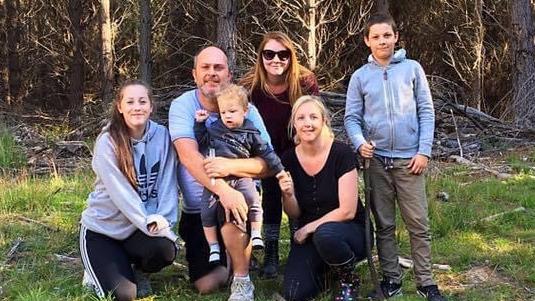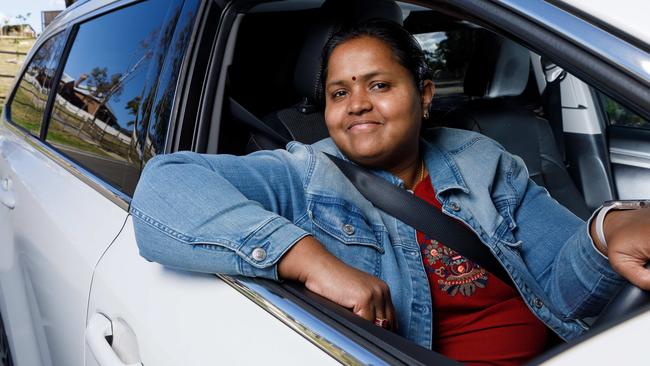Bizarre ways people are battling cost of living crisis revealed
There’s taking a second job and then there’s some of these crazy ways families are taking on the cost of living crunch. Could you go that far?
NSW
Don't miss out on the headlines from NSW. Followed categories will be added to My News.
Add standing in line at a food bank to the other queues of people – for a bus or train – that are part of life in Sydney. And for many lining up at food banks or charity stores, it’s the first time they have relied on charity.
OzHarvest founder and CEO Ronni Kahn said demand is higher than ever before – surpassing the record numbers reaching out for support during the pandemic.
Working professionals, such as are nurses and teachers, are even increasingly seeking help from the food rescue organisation, which collects quality excess food from commercial outlets and delivers it directly to more than 1300 charities.
“Demand for food is continuing at a very high level, it’s the worse I’ve seen in 19 years of running OzHarvest,” she said.
“We see the queues at every day at our free supermarket in Sydney, where we’re serving over 400 customers a day.
“New people come every week after googling ‘food relief’ and most are asking for help for the first time in their lives, they have jobs and homes but can’t make ends meet.”
St Vincent de Paul Society NSW CEO Yolanda Saiz said Vinnies has seen a huge increase in people seeking help despite being in a stable job.
“In Australia, the phenomenon of ‘working poor’ has traditionally been viewed as an American concept but we are seeing that alarming trend creep closer to home,” she said.
The latest figures from the Australian Bureau of Statistics show the cost of fruit and vegetables is up 4.9 per cent from last year and the cost of dairy products up almost 15 per cent. Even devon has risen to almost $10 a kilogram.
All of these measures are forcing people to get creative when it comes to saving money here and there.
Here are some of the other crafty ways people are saving a buck:
Lemons for lattes
Bartering has made a comeback, with hundreds of Australians opting to trade goods and services to save cash.
After noticing how many people and businesses were struggling in her area, Marrickville baker Sina Klug, owner of Miss Sina, realised there was an opportunity to help both her community and her own business.
“We were walking around and noticed that people had really full citrus trees and the fruit was just falling down. So we did a post in a local community group and said if people have excess backyard produce, we‘d be very happy to trade them for coffees, cakes or brunch,” she said.
The idea has since taken off.
“Every day people come in with kilos of mandarins, lemons, oranges, limes,” Ms Klug said.
In return, she gives them coffee and turns their produce into delicious cakes and cookies.

She’s also traded with other business owners.
“Last week we made a birthday cake for a local ceramist in exchange for some beautiful mugs and plates,” she said.
“There’s no stigma around it anymore. Everyone has barely any money these days, and it‘s a really lovely way to work around the rising cost of living. It‘s an amazing solution, just creates a very lovely community.”
Monique Jeremiah has also embraced bartering.
“I proudly use bartering as one way of being more economically savvy as I am not married and on a single income with a mortgage,” the 36-year-old said.
“I barter with my cleaner and have my place cleaned one a month in exchange for taking them out to events when I have tickets to improve their social life.”
Finding dinner in a forest and a canny idea
Foraging for your dinner and pickling produce – for a growing number of Sydneysiders taking up the old ways is putting food on the table.
Hawkesbury mum of four Kirsty Bertè has taken food for free to a new level. Open her linen cupboard and you won’t find a single towel, but instead dozens upon dozens of home canned vegetables.
She started running workshops on canning and mushroom foraging 12 years ago and recently has seen a huge uptick in demand for her business Permaculture Hawkesbury Valley Inc.
Ms Bertè grows much of her own produce herself, but said stocking up on in-season fruit and vegetables while they are cheap can help families prepare for when prices go up at different times of year.

“During Covid the interest in permaculture practices rose significantly, and it continues to rise now with the cost of living crisis we are experiencing,” Ms Bertè said.
Her workshops have been wildly successful, with more and more families desperate to learn how to stock up on preserved produce when things get tough.
One way Kirsty gets food for free is through foraging for mushrooms in pine forests.
Slippery Jacks and Saffron Milk Cap mushrooms are abundant especially in Autumn, and can be pickled or dehydrated and stored for a year.
“During mushroom season we take many people out to the forest and teach them how to identify edible mushrooms and how to preserve them for a year’s supply,” Ms Bertè said.
“We teach how to preserve your harvest from home or seasonable produce that are cheap when in season … and preserve them for a couple of years.”
New gigs driven by the need to pay those big bills
Peter and Glenice Negro’s dream throughout their working life was to travel across Australia in a caravan when they retired.
Ten years after leaving the workforce, the couple were hit with a sad reality – rising electricity bills, groceries and fuel meant their pensions were no longer enough. They could either sell their beloved caravan, or get back to work.

Through their daughter and granddaughter they were introduced to Door Dash, a delivery platform where drivers choose their own hours.
The couple, both in their 70s, became workers in the gig economy. They have joined thousands who have returned to work, or taken second jobs, to pay the bills.
“We thought about it for a while because we’re not that great with technology … but we feel absolutely blessed to be involved with it becomes it has enabled us to save,” Ms Negro said.
After getting used to the tech the pair worked out the perfect plan – Peter drives, and Glenice controls their deliveries on the app.
Going back to work wasn’t in their original plan, but the couple is relieved they were able to find a way to keep their caravan.
“Desperate times call for desperate measures, we just had to get our head around it and now it’s very easy,” Ms Negro said.

“You have to find ways to find that extra money or you will go under.”
The pair work four days a week when they need the cash, and they hope to start delivering while on the road on their caravan holidays as well.
Western Sydney mum Priya Aakassh was staying home with her kids and studying when she realised the bills were just too high.
Always being a confident driver, the mum started driving Uber after her kids were at school and in the evenings.
“Even a little bit of money makes a difference … even if it’s $200 or $300 a week it really helps me contribute,” Mrs Aakassh said.




